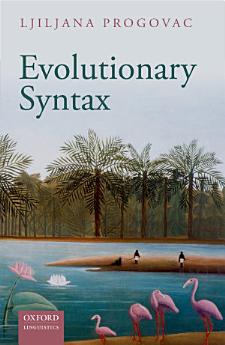Evolutionary Syntax
জুন ২০১৫ · Oxford Studies in the Evolution of Language কিতাপ 20 · OUP Oxford
ইবুক
320
পৃষ্ঠা
family_home
যোগ্য
info
reportমূল্যাংকন আৰু পৰ্যালোচনা সত্যাপন কৰা হোৱা নাই অধিক জানক
এই ইবুকখনৰ বিষয়ে
This is an open access publication, available online and distributed under the terms of a Creative Commons Attribution Non Commercial No Derivatives 4.0 International licence (CC BY-NC-ND 4.0), a copy of which is available at http://creativecommons.org/licenses/by-nc-nd/4.0/. Subject to this license, all rights are reserved In this book, Ljiljana Progovac proposes a gradualist, adaptationist approach to the evolution of syntax, subject to natural selection. She provides a specific framework for its study, combining the fields of evolutionary biology, theoretical syntax, typology, neuroscience, and genetics. The author pursues an internal reconstruction of the stages of grammar based on the syntactic theory associated with Chomskyan Minimalism and arrives at specific, testable hypotheses, which are then corroborated by an abundance of theoretically analysed 'living fossils' drawn from a variety of languages. Her approach demonstrates that these fossil structures do not just coexist alongside more modern structures, but are in fact built into the very foundation of more complex structures, leading to quirks and complexities that are suggestive of a gradualist evolutionary scenario. By reconstructing a particular path along which syntax evolved, Evolutionary Syntax sheds light on the crucial properties of language design itself, as well as on the major parameters of crosslinguistic variation. As a result, this reconstruction can be meaningfully correlated with both the hominin timeline and the ever-growing body of genetic evidence that is available.
লিখকৰ বিষয়ে
Ljiljana Progovac is Professor of Linguistics and Director of the Linguistics Program at Wayne State University in Detroit. She received her undergraduate degree in English from the University of Novi Sad, Serbia, and her Ph.D. degree in linguistics from the University of Southern California, Los Angeles. Her research interests include syntax, Slavic syntax, and the evolution of syntax. She is the author of Negative and Positive Polarity (CUP, 1994) and A Syntax of Serbian (Slavica, 2005), as well as multiple journal articles and conference papers on language evolution, and is co-editor of The Syntax of Nonsententials (Benjamins, 2006).
এই ইবুকখনক মূল্যাংকন কৰক
আমাক আপোনাৰ মতামত জনাওক।
পঢ়াৰ নির্দেশাৱলী
স্মাৰ্টফ’ন আৰু টেবলেট
Android আৰু iPad/iPhoneৰ বাবে Google Play Books এপটো ইনষ্টল কৰক। ই স্বয়ংক্রিয়ভাৱে আপোনাৰ একাউণ্টৰ সৈতে ছিংক হয় আৰু আপুনি য'তে নাথাকক ত'তেই কোনো অডিঅ'বুক অনলাইন বা অফলাইনত শুনিবলৈ সুবিধা দিয়ে।
লেপটপ আৰু কম্পিউটাৰ
আপুনি কম্পিউটাৰৰ ৱেব ব্রাউজাৰ ব্যৱহাৰ কৰি Google Playত কিনা অডিঅ'বুকসমূহ শুনিব পাৰে।
ই-ৰীডাৰ আৰু অন্য ডিভাইচ
Kobo eReadersৰ দৰে ই-চিয়াঁহীৰ ডিভাইচসমূহত পঢ়িবলৈ, আপুনি এটা ফাইল ডাউনল’ড কৰি সেইটো আপোনাৰ ডিভাইচলৈ স্থানান্তৰণ কৰিব লাগিব। সমৰ্থিত ই-ৰিডাৰলৈ ফাইলটো কেনেকৈ স্থানান্তৰ কৰিব জানিবলৈ সহায় কেন্দ্ৰত থকা সবিশেষ নিৰ্দেশাৱলী চাওক।







